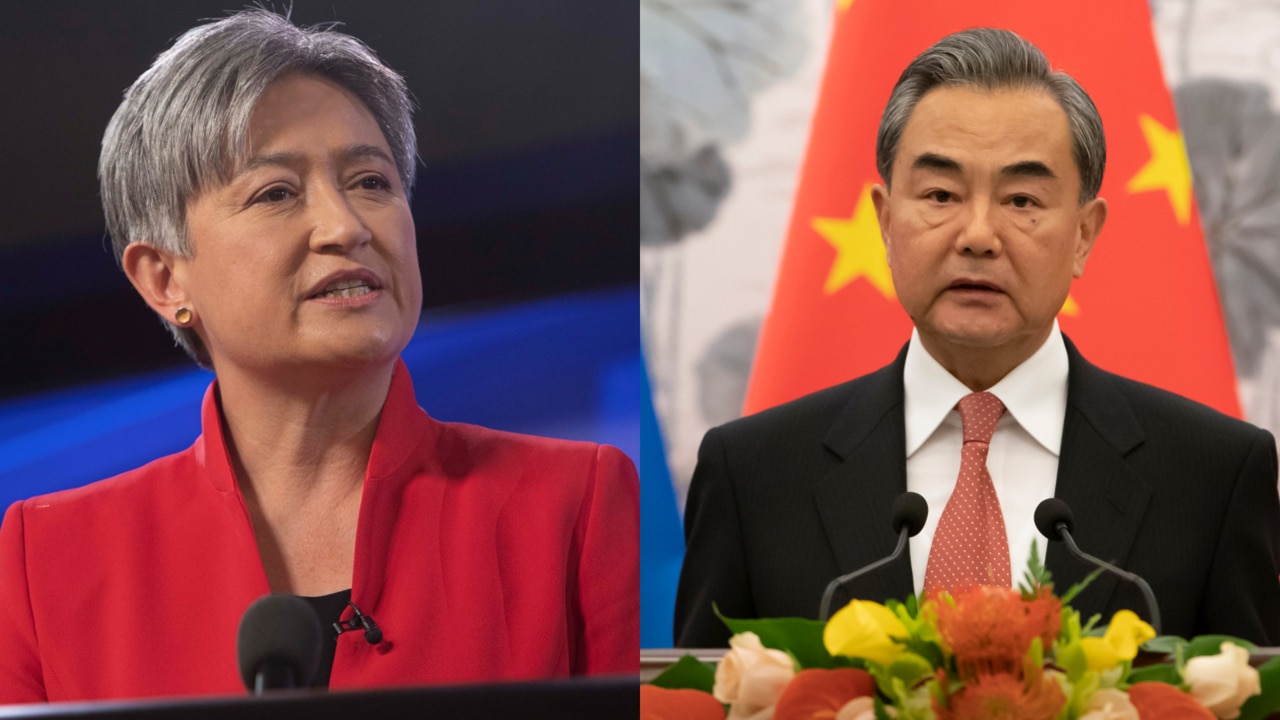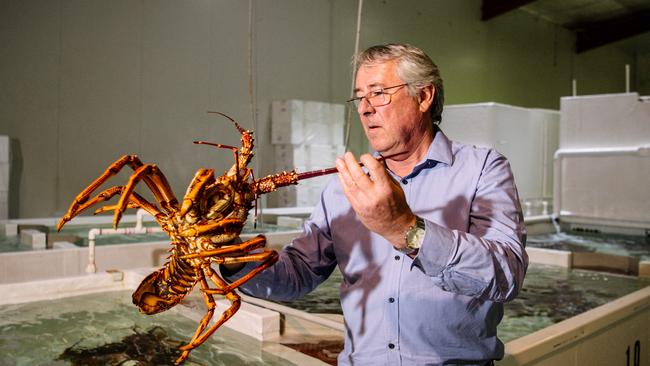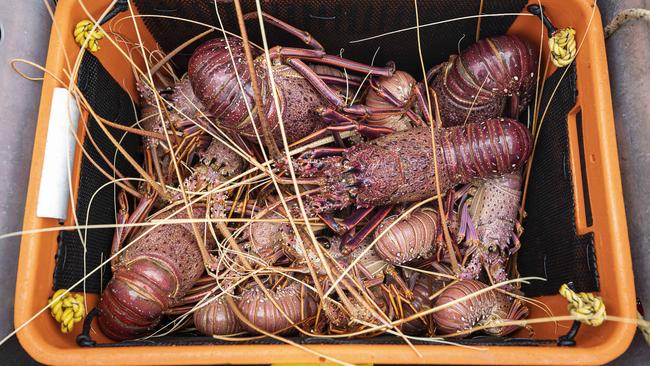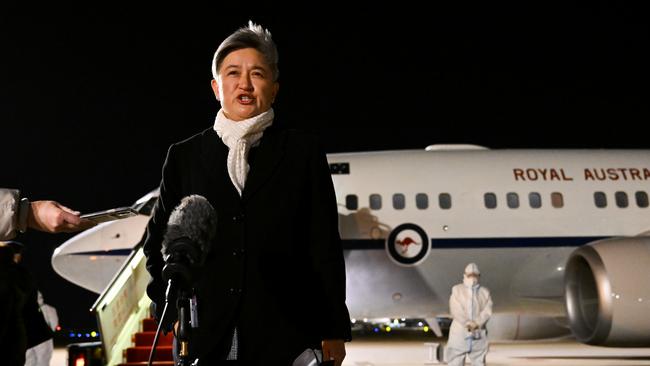Chinese customs move may signal trade thaw for Australian lobster, pearls, Ugg boots and more
Beijing’s powerful Customs Department has officially encouraged the buying of Aussie lobsters, Ugg boots and pearls.

In a further sign of improving ties between Australia and China, Beijing’s powerful Customs Department has officially encouraged the buying of Australian lobsters, health products, Ugg boots and pearls.
The statements are in an article published on the social media accounts of the General Administration of Customs this week ahead of a key visit to Beijing by Foreign Minister Penny Wong on Wednesday, and could be the first sign the unofficial ban on Australian lobsters, which hit Australian producers hard in October 2020, could be about to be relaxed.
In the article, which discussed the potential advantages of the Regional Comprehensive Economic Partnership (RCEP), China Customs listed a range of goods from Australia which it said were becoming attractive for Chinese consumers to buy under the agreement which came into force on January 1 this year.
“China has been Australia’s No. 1 trading partner for 13 consecutive years,” the article, published by the General Administration of Customs said.
“Australian lobster, sea cucumber, health products, wool boots and pearls are all products that are widely enjoyed by our consumers.”

It went on to introduce different types of Australian lobsters, pointing out that there was an immediate zero tariff under the RCEP.
But the problem with lobster sales to China was never about tariffs.
Australia’s exports of lobsters to China peaked at $750m in 2018-19 before the impact of Covid-19, representing 94 per cent of Australian lobster exports.
Exports were hit from early 2020 by Covid-19 shutdowns across China as the virus began spreading, closing restaurants, shops, and factories.
But the industry was shocked in late October 2020 to find its exports hit by complaints from Chinese customs that Australian lobsters could be contaminated by trace elements of metals and minerals.
The move saw hundreds of thousands of dollars’ worth of Australian lobsters in transit to China perish to the cost of Australian producers.
Extensive testing of Australian lobsters did not provide any evidence of the metals claimed by Chinese customs officials, but Australian producers began the expensive process of redirecting their exports to other markets and focusing more on the local market.
South Australian lobster fisherman, Andrew Ferguson, who lost $360,000 worth of lobsters which died at the international airport in Shanghai after they were unable to get through Chinese customs, welcomed the comments on the Customs Department website.

But he said Australian industry needed to be cautious about reports of any reopening of business between Australia and China given the events of the past three years.
“It sounds encouraging but we will have to wait and see,” he said.
“The past few years have cost us dearly as we have had to turn our business around.”
“We have had to be inventive and look for ways around the problem of losing the China market.”
The action against Australian lobsters came amid non-tariff action against Australian timber, beef and coal sales to China but with new tariffs on wine and barley killing two prosperous export markets.
Mr Ferguson said Australians needed to be careful about setting their sights on a reopening of the China market given the potential for politics to have a negative impact on trade in the future.
“What happens if everyone goes back to selling to China and some politician in the future says something wrong and the market shuts again?”

He said it would be “nice to know” if there was going to be any change in the market in China but he said he still had not forgotten the sickening feeling of waking up one morning to learn that his shipment of live lobsters to China could not enter the country because it had to be tested for “heavy metals.”
“Australia did all the testing for cadmium and heavy metals (in lobsters) and found that it was non existent,” he said. “We sent the results and never heard back.”
He said that his customers in China, most of which were in Shanghai, were very disappointed that they were not able to receive his lobsters, but he said they had since moved on to other businesses and no longer had import licences for lobsters.
He said he had built up his business with China over 20 years including many trips to the country before Covid-19 and developed strong ties with his customers.
“They were trusted partners in the supply chain. They always wanted our product.”
The Customs Department article also talked about the high “pharmaceutical” standard of Australian health products, which is overseen by the Therapeutic Goods Administration, noting the comparison with other countries where “health supplements are classified as food products”.
Companies such as Blackmores have had strong demand for their products in China in the past.
The article comes as Australia’s Foreign Minister Penny Wong is due to meet her counterpart in China in Beijing on Wednesday to celebrate 50 years of Australia-China political relations.
Australia China Business Council president David Olsson, said the comments in the article were “very encouraging developments (which were) consistent with the desire expressed to ACBC members by Chinese importers and distributors for renewed access to premium Australian goods and services.”

He said they were also a “timely reminder of the emerging importance of RCEP, highlighting the opportunity for Australian exporters to use RCEP as a platform to manage trade relations with China.”
“RCEP is only a new agreement, and we’ll need to do more work to understand the gains it offers.”
“But we should pay attention to the fact that China already recognises its importance in kickstarting the post-pandemic economic recovery, and as a platform for re-engaging with Australia.”
Mr Olsson said the Australia-China business community was awaiting the outcome of the meeting in Beijing “with a sense of tempered expectation”
He said it was a “good sign” that the Australian Foreign Minister was invited to visit Beijing.
“We have also been encouraged by renewed interest we have received from China’s trade promotion body, CCPIT, for business round tables and delegations.”
The Business Council of Australia and ACBC are now planning a business delegation visit to China “as soon as travel conditions allow.”
“For most businesses, it’s been nearly three years since they were last able to visit China,” Mr Olsson said.
“There is a huge demand and need for Australian companies to visit their distributors and manufacturing sites, to reconnect with customers and to develop an informed assessment of the market opportunities.”
He said Chinese companies were also keen to reconnect with Australian exporters.
“Australian goods and services continue to be in demand,” he said.




